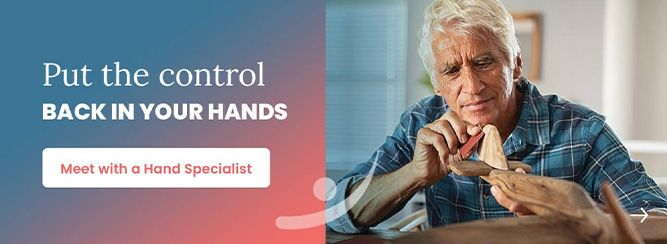Most of us know when our body is telling us something just isn’t quite right. Like if you’re suddenly having trouble doing something simple that you’ve been able to do your whole life—like closing your hand into a fist. If you’ve noticed any pain or weakness in one or both of your hands to the point that you can’t make a fist, a hand condition may be to blame.
Read on to learn three potential conditions that may be why you’re having trouble gripping, what causes them, and when to see a hand specialist for treatment.
Potential Causes
Most of the time, when patients can’t make a fist, it’s because they have one of these three common hand conditions:
- Hand Osteoarthritis
- Hand Rheumatoid Arthritis
- Trigger Finger
Hand Osteoarthritis
One potential culprit for why you can’t make a fist is osteoarthritis.
Osteoarthritis is the most common type of hand arthritis. In fact, about half of all women and a quarter of all men will experience it by the time they hit age 85.
Also known as “wear and tear” or degenerative arthritis, osteoarthritis causes the cartilage to break down and wear away. Without cartilage, your hand bones rub together, causing pain. It also leads to stiffness and loss of movement. So if you can’t make a fist, hand osteoarthritis could be the culprit.
Hand Rheumatoid Arthritis
Another type of hand arthritis and a potential reason you can’t make a fist is rheumatoid arthritis, also known as RA.
In fact, in 2019, researchers found that difficulty making a fist is considered a risk factor for progression to rheumatoid arthritis.
Rheumatoid arthritis is a chronic inflammatory disease that causes the lining of the joints to swell, and like osteoarthritis, leads to pain, stiffness, and loss of mobility in your hand.
For most people with rheumatoid arthritis, the same joints on both sides of their body are affected. So, if you have rheumatoid arthritis and can’t make a fist with one hand, chances are, you probably have trouble forming a fist with your other hand too.
Trigger Finger
Trigger finger is another common disorder that can make it challenging to make a fist. This condition causes pain and a snapping or locking of the fingers or thumb. The locking sensation is often referred to as “triggering.”
Trigger finger is caused by a thickening of the tenosynovium, a thin layer of tissue that covers the tendons. It can occur with prolonged grasping or weight bearing on the hand, like when someone uses a cane or does a lot of work with hand tools.
As the condition progresses and your tendon becomes larger, it can become completely stuck inside its sheath. Your finger or thumb may become locked or stuck in a bent position, so you can’t make a fist. Less often, trigger finger can keep your digit in an extended position.
How Do You Know If You Have Hand Arthritis?
If you can’t make a fist and hand arthritis is suspected, your doctor will examine your hands and joints.
They may take X-rays to identify any cartilage loss or the formation of bone spurs. They will also review your family medical history to inform their diagnosis.
Discover how to spot different types of hand arthritis
Treatments for Hand Arthritis
Depending on the type and severity of your hand arthritis, different treatment options are available to help you manage your symptoms and get you pumping your fists again.
Non-drug treatments: Hand exercises or hot or cold therapy may be recommended to help ease arthritis pain.
Drug treatments: Steroid injection into the joint or antiinflammatory pills can help a patient recover their motion.
Surgical treatments: If the above treatment options don’t help, your hand specialist may recommend surgery. A hand surgeon can release trapped tendons, remove damaged cartilage, and fuse bones together or replace a damaged joint with an implant.
If You Can’t Make a Fist, Make an Appointment
If you’ve been suffering from any pain or difficulty using your hands, IHTSC’s experienced team can help. Our hand specialists will work to figure out what’s going on and get you the treatment you need.
Request an appointment online or call our office at (317) 751-5904 to book a time to see a hand doctor.

You might also like: